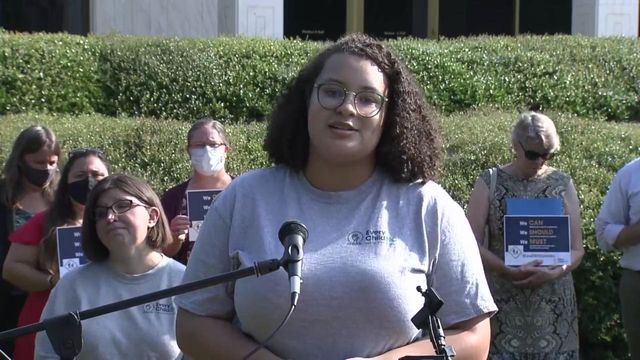Education advocates lobby NC lawmakers to fund the $800 million-per-year Leandro plan
Every Child NC held a news conference prior to lobbying efforts Wednesday morning, featuring students who detailed the ways in which their education, because of a lack of resources, had held them or others back.
Posted — UpdatedAdvocates urged lawmakers to fully fund the plan outlined in the quarter-century old Leandro education equity lawsuit. That plan would cost more than $5.6 billion over the next eight years, which several Democratic lawmakers have argued the state can afford to do. Republicans, however, have left almost all of that plan out of their House and Senate budget proposals and disagree with the plan’s pace of spending.
Every Child NC held a news conference prior to lobbying efforts Wednesday morning, featuring students who detailed the ways in which their education, because of a lack of resources, had held them or others back.
Cynthia Ribustello, a rising senior at the North Carolina School of Science and Mathematics, recalled books falling apart, injured students unable to see a nurse, combined gifted and traditional classes, a lack of air conditioning and permanent substitute teachers during her 10 years as an Edgecombe County student.
“I am saddened, sickened and heartbroken that I endured this for over a decade,” Ribustello said.
Another student, rising Orange County senior Emily Escobedo-Ramirez, explained how she read at a middle school level in only the fourth grade and passed her tests “with flying colors,” but was never considered for academically and intellectually gifted programming.
“I wasn’t given the support I needed,” she said. So she challenged herself on her own.
“My white peers got better educations, and I didn’t, and I knew I deserved better and I had to do something,” she said. In high school, she signed up for three Advanced Placement courses her sophomore year and later enrolled in the International Baccalaureate program.
She at last was learning at the pace she “desperately needed” and feels for those who don’t have access to rigorous coursework.
Letha Muhammad, founder of Education Justice Network and parent of a 10th grader, said lawmakers are “playing games” and drew a comparison between a parent who can be held criminally liable for keeping their child out of school to lawmakers not funding the full Leandro plan.
“It’s really criminal that 27 years later we’re still standing here, demanding that our schools are adequately funded so that our students get the education they deserve,” Muhammad said.
Susan Book, a mother of a special needs child lamented low pay for the classroom aides that her son needs to be able to learn in the traditional classroom environment.
“I’m sure there are legislators out there right now talking to members of the press about how generous they are to education,” Book said. “However, all I see is crumbs.”
The Leandro long-term action plan is a part of the drawn-out lawsuit known colloquially as the Leandro case, a reference to the original student plaintiff. The case dates back to when five low-wealth school districts sued the state in the 1990s, contending the state didn’t adequately fund them to provide quality education access and that they didn’t have the tax base to do it themselves.
The state Supreme Court later found in favor of the plaintiffs in 1997. In 2002, Wake County Superior Court Judge Howard Manning ruled the state had violated students’ rights to a “sound, basic education” and ordered the state to remedy that.
A few years ago, the state hired WestEd as an education consultant to come up with a plan to do that. The consultant report was a major influence in the long-term action plan, along with a task force established by Gov. Roy Cooper.
The new spending outlined in the long-term plan plan is largely for lower-wealth school districts; for spending more money on students with disabilities and students learning English; for providing more support staff, such as counselors, nurses and psychologists; and for expanding pre-kindergarten and early childhood education across the state.
The $5.6 billion total averages out to less than $800 million in new funding per year. State education spending totals about $9.75 billion annually.
The long-term action plan notes federal stimulus funding for schools is helpful, but entirely separate, from the plan. Republican leadership has suggested using some of the stimulus money toward the plan.
Related Topics
• Credits
Copyright 2024 by Capitol Broadcasting Company. All rights reserved. This material may not be published, broadcast, rewritten or redistributed.





